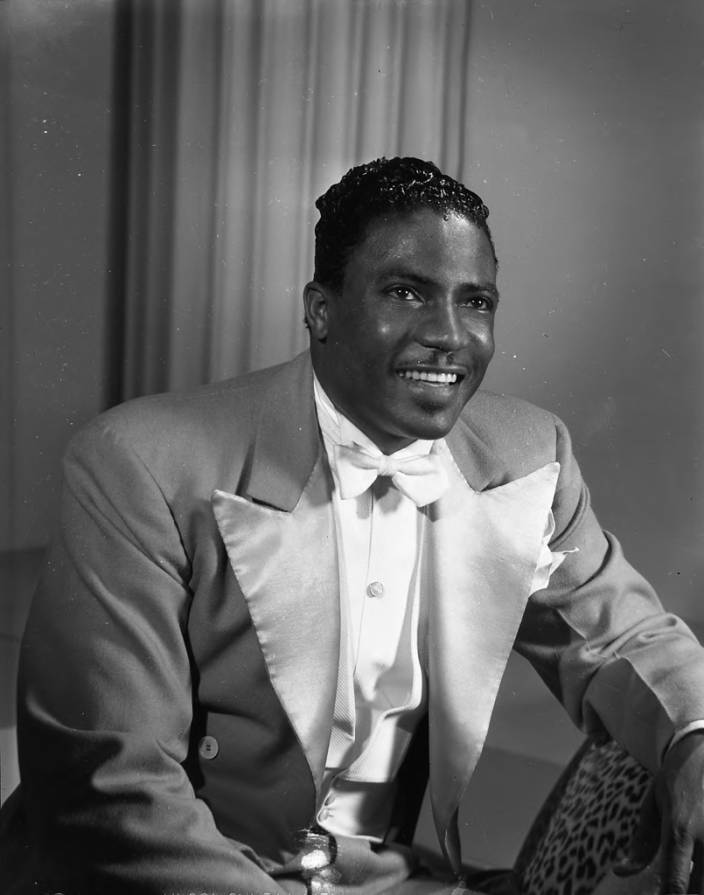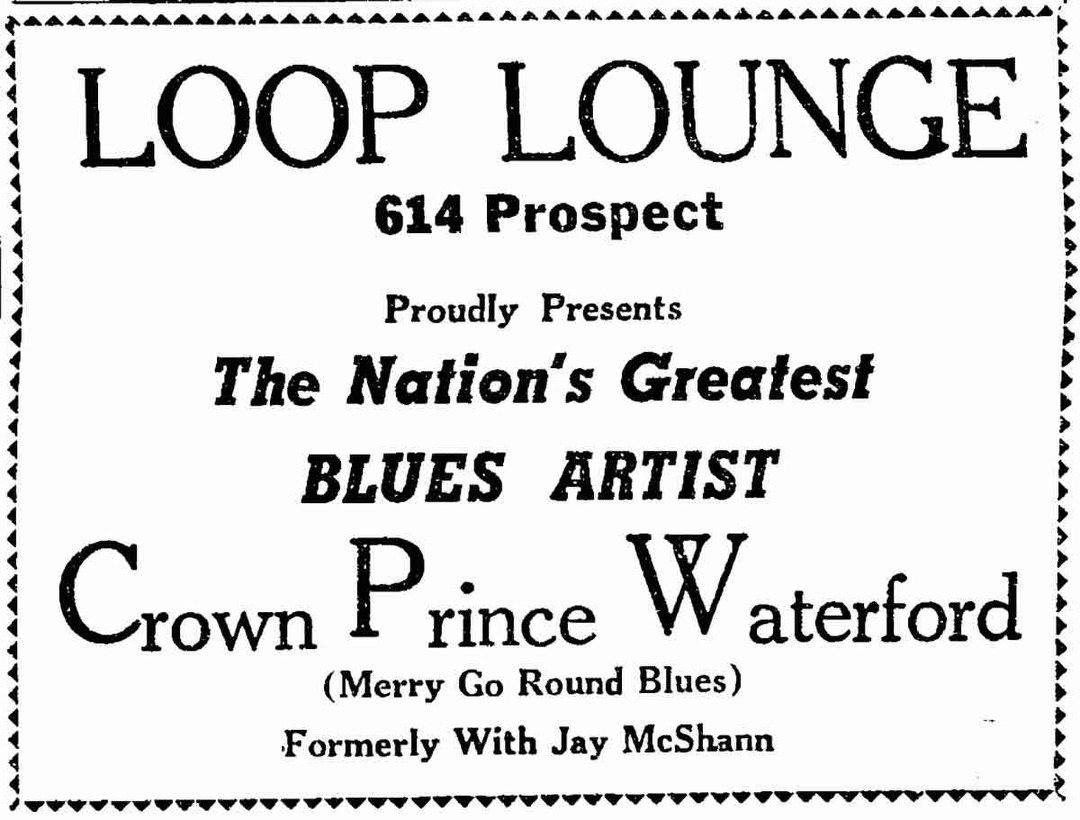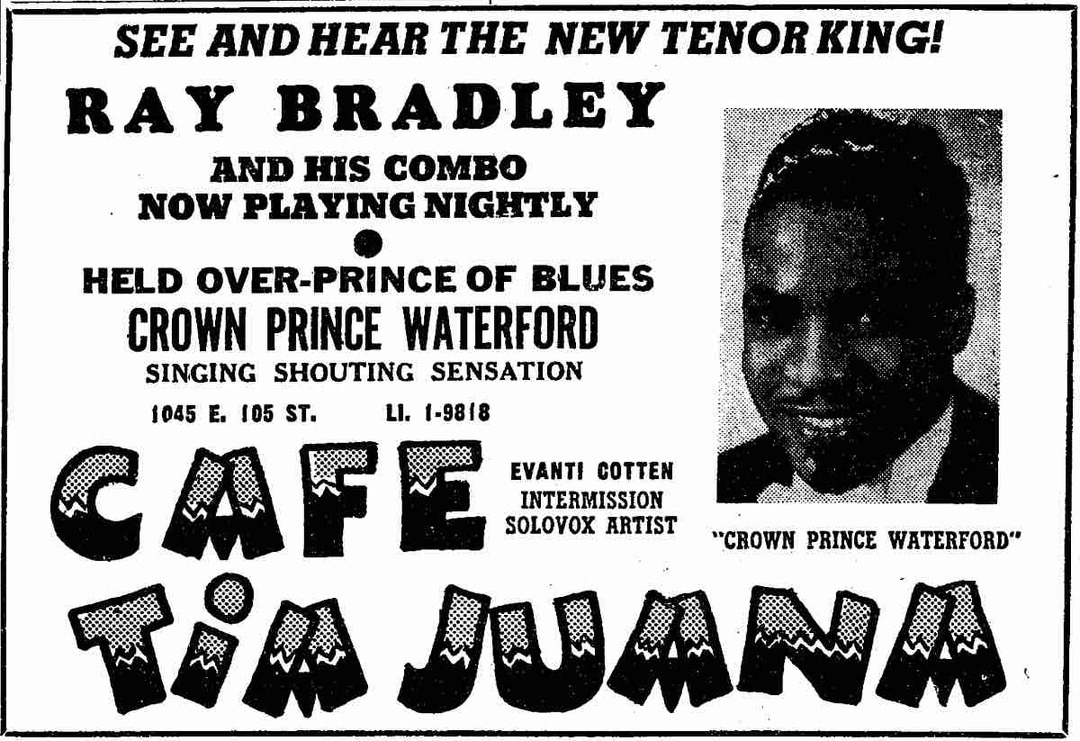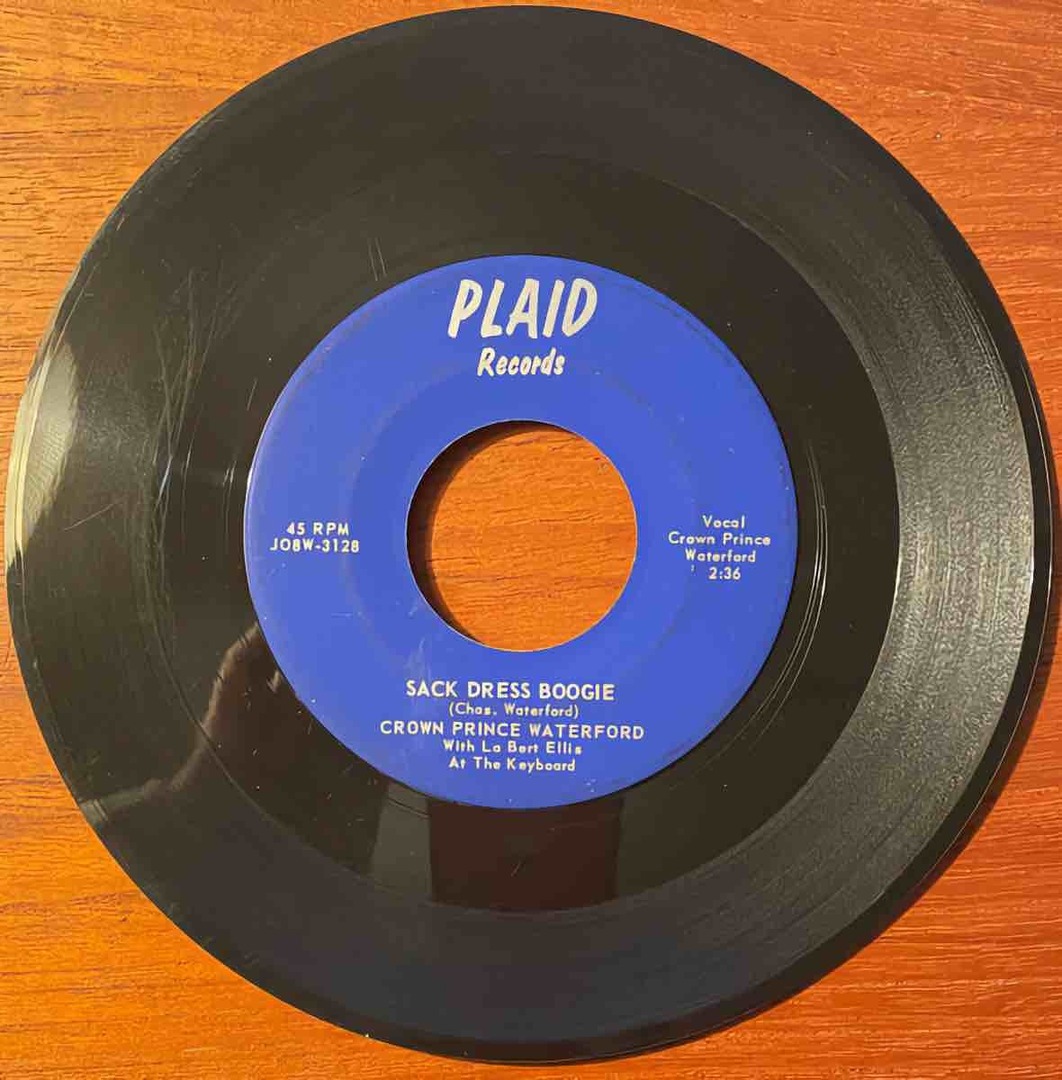
Crown Prince Waterford, an Arkansas-born itinerant blues musician, toured the country in the mid-20th century. Waterford grew in popularity throughout Cleveland due to his performances at some of the area's top music bars and nightclubs.
Soloman Charles Waterford, better known as Crown Prince Waterford, was born on October 26, 1916, in Jonesboro, Arkansas. Growing up, music was a staple to Waterford’s family, and it played a massive role in Waterford’s upbringing. In an interview with Call and Post reporter John E. Fuster, Waterford recollected,“It was just natural that I was born with a song in my heart.” Waterford’s father attended Wilberforce University, where he was a part of the Glee Club, and his mother was a talented pianist, organist, and harpist. Waterford was one of five children in his family. All three of his sisters were musicians, two of whom were members of Cleveland's original “Wings Over Jordan” chorus. His sister Evanna Cotten sang and played the piano in many nightclubs in Cleveland. Waterford’s brother was a member of the Glee Club at Tuskegee Institute, where Crown Prince also attended.
Waterford’s formal music career began in 1936 in Oklahoma City, where he had lived for most of his late adolescence. His first professional experience playing in a band began when he sang with Leslie Sheffield’s Rhythmaires. He later joined Jay McShann’s band, which Waterford noted gave him a big boost in the music industry. By the late 1930s, Waterford joined Andy Kirk’s 12 Clouds of Joy as the band’s blues shouter after auditioning at Chicago’s Savoy Ballroom. Waterford took a brief hiatus from his music career to serve in the United States Army during the Second World War. After the war, his career skyrocketed when he gained popularity playing in many of Chicago’s nightclubs.
Waterford, who made his living as an itinerant musician, made his first known appearance in Cleveland sometime in 1950. At this point, he had recorded for several different labels like Hy-Tone in Chicago and King Records in Cincinnati. In May 1950, Waterford played his first show at the Loop Lounge, a Prospect Avenue nightclub that attracted many notable musicians such as Dizzy Gillespie and Billie Holiday. From July to mid-August that same year, Waterford performed nightly at one of the most well-known clubs in Cleveland, Cafe Tia Juana, which was located on East 105th Street. After this six-week engagement, Waterford was informed by his booking agency that he was scheduled to appear in Kansas City where he would form his own band. From there Waterford and his band performed at the Municipal Auditorium in Kansas City, followed by an additional fifty-two one-night shows throughout the South and finally to the West Coast, ending in Los Angeles.
Waterford returned to Cleveland in December 1950 with his new orchestra, “The Four Crowns.” He and the Four Crowns—which included Jimmy Saunders on the piano, Benny Miller on the tenor saxophone, Bobby Smith on the drums, and Richard Mitchell on the bass—played at the grand reopening of the Lucky Bar on Cedar Avenue on December 29th. The Lucky Bar was excited to have Crown Prince Waterford perform and announced at their reopening that they planned to hold the Crown Prince Amateur Contest on Tuesday nights. Waterford played at Lucky Bar until mid-January the following year.
Waterford continued to frequent Cleveland's leading nightspots. In September 1951, he returned to Cafe Tia Juana, where he shared the stage with Ray Bradley and his Combo, who were playing nightly at the popular south-of-the-border-themed nightclub. Additionally, his sister Evanna Cotten (sometimes referred to as “Evanti”) played the solovox during the intermission of Waterford’s set. Waterford played at Cafe Tia Juana until November 1951. After he completed his engagement at Cafe Tia Juana, he went on another tour where he played in numerous cities in the South and ended in California. Waterford returned to Cleveland in late 1952, and by this time his Orchestra had disbanded and he began to play independently. Waterford, along with other local performers, was invited to play at Jack’s Musical Bar on Cedar Avenue in April 1953, where he reportedly gave an “in-command performance.” Waterford was the main act on the Friday night he performed and then played two additional shows the following Saturday. A Call and Post reporter noted that Crown Prince arrived at Jack’s Bar, “Big, handsome, and in his finely tailored full dress suits of various colors.”
Waterford’s role in the music and nightclub scene extended beyond Cleveland and into the Cuyahoga Valley. Waterford played at Lake Glen Country Club in Peninsula, twenty-six miles south of Cleveland, every weekend from July to September of 1957. After his time at Lake Glen, Waterford took a road trip back to Oklahoma to visit his parents, and then he returned to Cleveland where he played several smaller shows at places like Wade Park Avenue’s Rufus Nelson’s Blackstone Cafe. In 1958, he recorded the first 45 records for Plaid, one of the house labels started by Tom Boddie, an African American Clevelander who went on to open Boddie Record Company in the Union-Miles neighborhood a few years later. Waterford returned to Lake Glen in August 1959, ending his weekend performances the following month. He played at several small Cleveland nightclubs after leaving Lake Glen. All mentions of Waterford in the Call and Post cease after 1961. As styles of music were evolving at this time Crown Prince attempted to become a “twist” artist in 1962 and recorded an album under the Orbit Record label, with his band the Twistologists.
As new styles and new artists emerged, Crown Prince Waterford left the music industry, became ordained as Reverend Charles Waterford, and moved to Florida in 1965. Rev. Waterford successfully set up several churches in northern Florida. Despite leaving his blues days behind, Waterford continued singing and recorded a gospel album titled The Reverend Waterford Sings. After he retired from the ministry, he briefly returned to his blues days when he performed at the Springing the Blues Festival in Jacksonville Beach in 2002.
Waterford passed away in Jacksonville at the age of 90 in 2007. From blues shouter to gospel artist, Crown Prince Waterford is remembered nationally and locally in Cleveland for his distinctive style of singing and the aura of royalty that gave him none other than the stage name, Crown Prince.
Images



